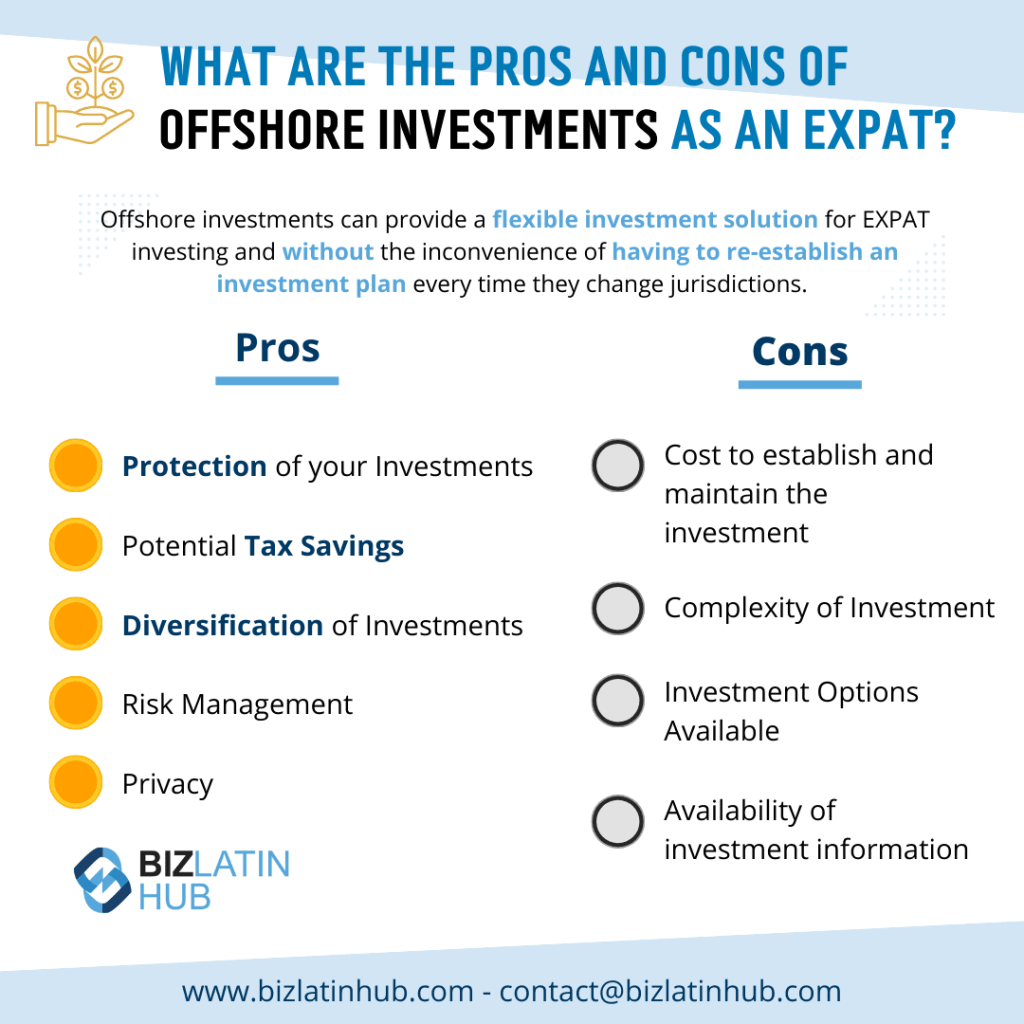How Offshore Investment Works: A Step-by-Step Malfunction for Capitalists
Offshore financial investment provides a structured path for capitalists seeking to optimize their economic approaches while leveraging worldwide opportunities. The procedure starts with the careful selection of a territory that lines up with an investor's objectives, complied with by the facility of an account with a qualified overseas institution.

Comprehending Offshore Investment
Comprehending overseas investment entails recognizing the critical advantages it uses to firms and individuals seeking to maximize their financial portfolios. Offshore financial investments generally describe properties held in a foreign territory, often defined by desirable tax routines, governing environments, and privacy securities. The key intent behind such financial investments is to enhance funding risk, growth, and diversification monitoring.

Financiers can access a large selection of economic tools via overseas places, consisting of supplies, bonds, shared funds, and genuine estate. These investments are typically structured to adhere to regional legislations while offering versatility in terms of asset allocation. In addition, overseas financial investment methods can allow individuals and companies to hedge versus domestic market volatility and geopolitical risks.
Another trick facet of offshore investment is the potential for boosted personal privacy. Numerous offshore territories have stringent confidentiality regulations, which can shield a financier's financial details from public disclosure. Nonetheless, it is important for investors to continue to be certified with their home country's tax obligation guidelines and reporting needs, as non-compliance can cause severe fines. For that reason, a thorough understanding of both the commitments and benefits connected with offshore financial investments is important for educated decision-making.
Advantages of Offshore Spending
Investors typically transform to offshore spending for its numerous advantages, including tax obligation performance, property protection, and portfolio diversification. Among the key advantages is the potential for tax optimization. Numerous offshore territories use desirable tax regimes, allowing financiers to lawfully minimize their tax obligation responsibilities and maximize returns on their investments.
Additionally, offshore accounts can give a layer of possession security. Offshore Investment. By putting possessions in politically steady territories with strong privacy legislations, financiers can protect their wealth from potential legal claims, creditors, or financial instability in their home nations. This kind of security is especially attracting high-net-worth individuals and entrepreneurs encountering lawsuits dangers
Moreover, offshore investing helps with portfolio diversity. Accessing global markets allows financiers to check out opportunities in various property courses, consisting of property, stocks, and bonds, which may not be offered domestically. This diversity can lower general portfolio threat and boost prospective returns.
Ultimately, the benefits of offshore investing are engaging for those seeking to optimize their economic techniques. However, it is vital for financiers to extensively comprehend the effects and guidelines connected with offshore investments to ensure compliance and accomplish their financial goals.
Picking the Right Jurisdiction
Picking the ideal territory for offshore investing is a critical decision that can substantially influence an investor's monetary approach. The right jurisdiction can supply click site numerous benefits, including beneficial tax obligation frameworks, property defense laws, and regulatory atmospheres that line up with a capitalist's objectives.
When picking a jurisdiction, consider elements such as the political stability and economic health and wellness of the nation, as these components can influence financial investment protection and returns. Furthermore, the legal framework surrounding foreign investments should be evaluated to guarantee compliance and protection of assets. Countries known for durable lawful systems and openness, like Singapore or Switzerland, commonly impart higher confidence amongst capitalists.
In addition, other examine the tax implications of the jurisdiction. Some countries supply eye-catching tax incentives, while others might impose stringent coverage demands. Comprehending these nuances can aid in maximizing tax liabilities.

Steps to Establish Up an Offshore Account
Establishing an offshore account entails a series of methodical actions that make certain compliance and safety. The primary step is choosing a reputable offshore banks, which should be certified and managed in its territory. Conduct comprehensive research study to analyze the institution's trustworthiness, solutions supplied, and consumer reviews.
Next, gather the needed documents, which commonly includes identification, proof of address, and information relating to the resource of funds. Various territories might have differing needs, so it is critical to validate what is required.
As soon as the documentation is prepared, initiate the application process. This might involve filling out forms online or face to face, depending on the institution's methods. Be planned for a due persistance procedure where the financial institution will certainly confirm your identity and examine any kind of prospective dangers linked with your account.
After authorization, you will certainly obtain your account information, permitting you to fund your offshore account. It is recommended to preserve clear documents of all transactions and abide with tax obligation policies in your home nation. Developing the account appropriately establishes the structure for reliable offshore investment monitoring in the future.
Handling and Monitoring Your Investments
When an overseas account is successfully established, the emphasis moves use this link to managing and monitoring your financial investments effectively. This important phase involves a methodical approach to ensure your possessions straighten with your economic objectives and risk tolerance.
Begin by developing a clear investment strategy that details your goals, whether they are prime preservation, income generation, or development. On a regular basis examine your portfolio's efficiency versus these criteria to assess whether modifications are needed. Using financial administration tools and systems can facilitate real-time monitoring of your financial investments, supplying understandings into market fads and asset appropriation.
Engaging with your overseas economic consultant is essential. They can provide expertise and support, aiding you navigate complicated international markets and regulative settings. Schedule regular evaluations to review performance, examine market problems, and recalibrate your technique as needed.
In addition, remain notified concerning geopolitical growths and economic indicators that may affect your financial investments. This aggressive approach enables you to respond immediately to transforming circumstances, ensuring your offshore portfolio stays durable and straightened with your financial investment objectives. Inevitably, diligent management and ongoing tracking are necessary for maximizing the benefits of your offshore investment strategy.
Conclusion
In verdict, overseas investment offers a critical opportunity for portfolio diversity and danger monitoring. Proceeded monitoring and collaboration with monetary advisors continue to be necessary for maintaining a dexterous investment strategy in an ever-evolving worldwide landscape.
Offshore investment provides a structured path for financiers looking for to enhance their economic methods while leveraging global chances.Recognizing offshore financial investment involves acknowledging the strategic benefits it offers to companies and people seeking to enhance their economic portfolios. Offshore financial investments typically refer to possessions held in an international jurisdiction, commonly characterized by beneficial tax obligation regimes, regulatory atmospheres, and personal privacy protections. Furthermore, overseas financial investment strategies can allow people and services to hedge against domestic market volatility and geopolitical threats.
